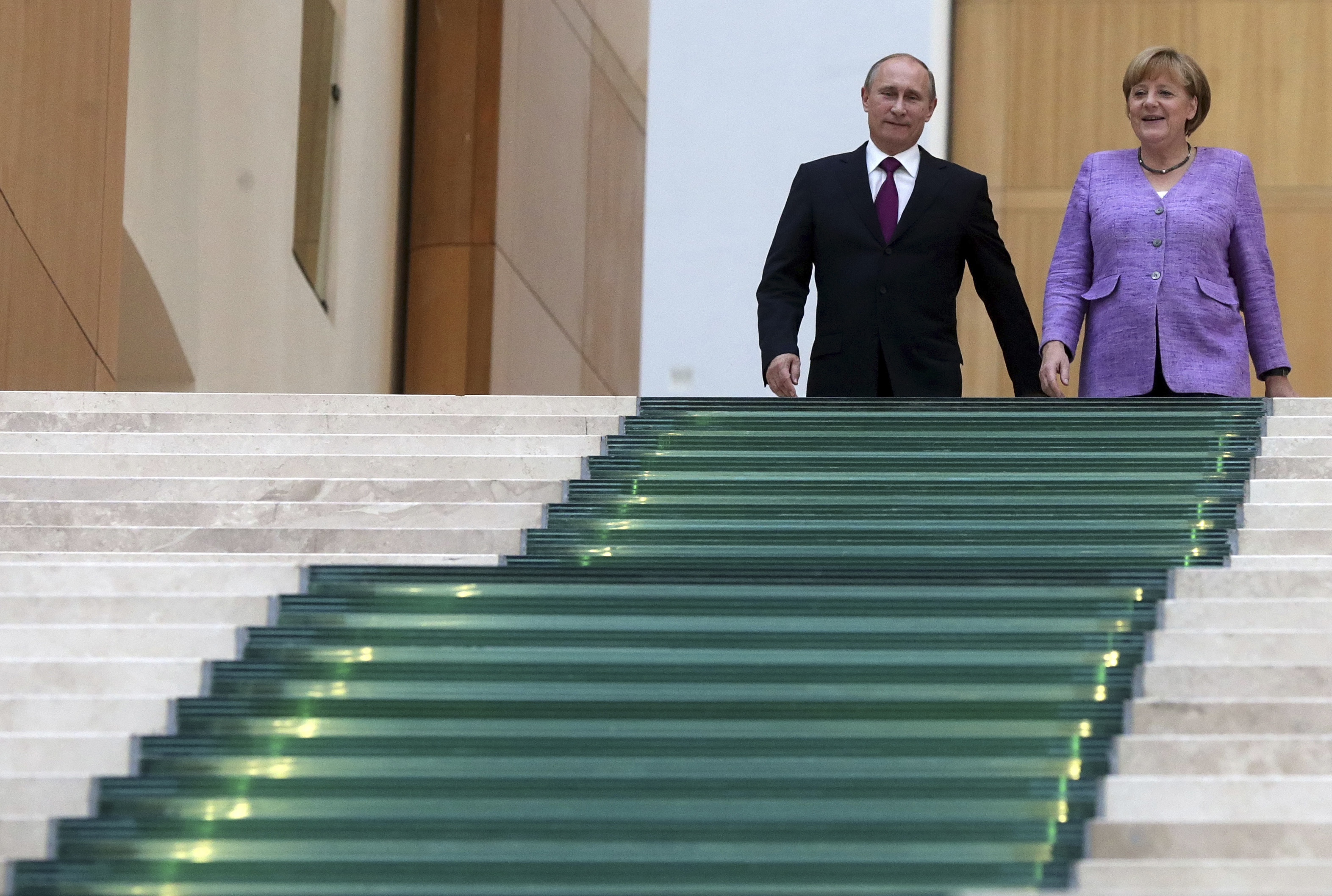Is Germany cozying up to Russia?
There are some troubling signs...


A free daily email with the biggest news stories of the day – and the best features from TheWeek.com
You are now subscribed
Your newsletter sign-up was successful
As everyone now knows, Russia is slowly invading and annexing parts of Ukraine, which could have very serious ramifications in terms of the West's credibility in protecting smaller states from the orbit of authoritarian tyrannies like Putin's Russia.
Now, Russia keeps pretending that the whole Ukraine fiasco is an internal affair started by rebels, and that Russia itself has no involvement. Ukraine and the U.S. have produced voluminous evidence to the contrary. No one believes Russia. (Heck, bald-faced, bravado-fueled lying is a great Communist tradition.) Except that maybe Germany believes Russia.
Last week, Germany became the only noteworthy country besides Russia to disagree with the U.S. government over the extent of Russia's involvement in Ukraine. More broadly, Germany has been striking a more dovish tone than the rest of the EU and the U.S. about Russia's involvement in Ukraine, even as Chancellor Angela Merkel calls on the EU to keep the sanctions pressure on Russia.
The Week
Escape your echo chamber. Get the facts behind the news, plus analysis from multiple perspectives.

Sign up for The Week's Free Newsletters
From our morning news briefing to a weekly Good News Newsletter, get the best of The Week delivered directly to your inbox.
From our morning news briefing to a weekly Good News Newsletter, get the best of The Week delivered directly to your inbox.
Overall, this is a big problem.
Given that Russia has nukes, one of the very few available options for containment is through economic sanctions. But for economic sanctions to work — and financial sanctions in particular — countries have to present a united front.
If Germany were to become a dependable ally of Russia, that would be a major enabling factor in Putin's irredentism and Russia's slide toward fascism. It would also risk fracturing the European Union even further.
The question of Germany's relationship with Russia, in many ways, is as old as the two countries themselves. Located in the middle of Europe, Germany has always had to choose between allying with the countries to its east to protect its west, or vice versa.
A free daily email with the biggest news stories of the day – and the best features from TheWeek.com
The most obviously pro-Russia German administration in recent years was that of the Social-Democrat Gerhard Schröder, who notoriously backed a pipeline plan that would supply Germany with Russian gas while bypassing Eastern Europe, thereby leaving them at the mercy of Russia's pipeline extortion. Schröder was later rewarded with a lucrative position with Russia's state energy giant Gazprom.
Germany is one of the pillars of the European Union and the European project. The EU needs a Germany whose interests are focused on solidarity with its European neighbors — particularly Eastern European countries still very understandably resentful over Russian expansionism — and not on cutting side-deals with Russia.
Angela Merkel, who is sincerely pro-European, had hitherto struck a less pro-Russia tone as chancellor.
So what has changed?
First, her government's decision to abandon nuclear power has made Germany more dependent on natural gas imports, and therefore on Russia.
Second, it is increasingly clear to all involved that nobody can trust the U.S. After all, the Obama administration has still basically not outlined a strategy for how to deal with the Ukraine situation. Why would Germany spend political capital facing off against Russia when there is no plan to muscle Russia out of Ukraine, and no true political will to see it done?
Third, and perhaps most importantly, Germany will keep its attention focused on Europe only when it is wedded to France. It is the French-German "couple" that has been the engine of the European Union. As Charles de Gaulle understood, it is incumbent upon France to build as tight a relationship with Germany as possible so that bad instincts may be smothered and that the two couples might give the continent a unifying vision. But while François Hollande's foreign policy has seen some bright spots, notably dealing with Islamists in sub-Saharan Africa, his lack of vision and his country's general economic malaise have prevented France from taking any kind of leadership role, either in Ukraine or in the EU at large (which has also been a major source of aggravation of the Euro crisis).
Right now, Germany feels that it is alone to deal with Europe's many problems, and that if it has to cut some slack to Russia on Ukraine to have space to deal with its other problems, then so be it. And thus, lack of leadership begets lack of leadership, making everyone worse off.
Pascal-Emmanuel Gobry is a writer and fellow at the Ethics and Public Policy Center. His writing has appeared at Forbes, The Atlantic, First Things, Commentary Magazine, The Daily Beast, The Federalist, Quartz, and other places. He lives in Paris with his beloved wife and daughter.
